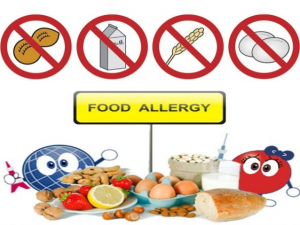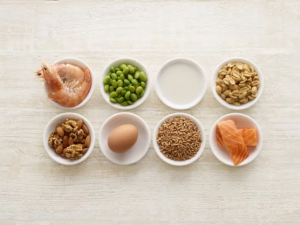When someone has a food allergy, their immune system wrongly sees the food as hostile and the body’s defense mechanism springs into action. This produces a range of symptoms that can vary from mild itching to severe breathing difficulties or even shock. These symptoms usually happen immediately after eating the food. The factors that cause allergy may be family medical history, age, asthma, or other allergies.

6%~8% of toddlers and 3% of adults are plagued by food allergy. By far there isn’t an effective cure, although the risk of food allergy has been increasing in some children. Most people are confused between food allergy and food intolerance. What is food intolerance? When someone is intolerant to a food, the immune system is usually not involved and symptoms take much longer to develop and are generally not life-threatening. However, food intolerance can adversely affect long-term health.
The common symptoms of food allergy
According to individual physical condition, the symptoms are different. Eating the same food, the food allergy may cause discomfort for some people, but may cause death for others. The symptoms usually happen within several minutes or 2 hours when eating “harmful” food.
Maybe you got a food allergy if you have the following symptoms:
- Pricking or itching in the mouth and throat.
- Urticaria, itching, or eczema.
- Swelling in the lips, face, tongue, or the other parts of the body.
- Gasping, stuffy nose, or breathing difficulty.
- Stomachache, diarrhea, nauseating, or vomiting.
- Dizziness, or fainting

The reactions of allergy
Some people may get severe allergy reactions as below because of food allergy, which damages the health or causes death.
- Tighten the airway.
- Swelling in the throat causes breathing difficulty.
- The shock with the blood pressure has dropped severely.
- Dizziness, or fainting
- Rapid pulse
Note: prompt first aid treatment is critical for allergy reactions.
What may cause a food allergy?
For adults, most food allergies are caused by proteins such as:
- Shellfish like shrimp, lobster, and crab.
- Peanut
- Tree nuts like walnuts and pecans.
- Fish

For the baby, most food allergies are caused by proteins such as:
- Peanuts
- Tree nuts
- Egg
- Milk
- Wheat
- Soya bean

Pollen allergy syndrome
Usually, people with hay fever suffer from pollen allergy syndrome. This syndrome not only results from pollen, but also some fresh fruits, nuts, or spices, which may cause numbness, itching, or(and) swelling in the throat. Because the protein inside the fruit or vegetables is similar to the protein inside the pollen that could lead to allergy. But don’t worry, the symptoms are not that serious if this food can be cooked. The following chat shows what kind of fruit, vegetables, nuts, or spices have a similar protein as pollen:
| When you’re allergic to the pollen of these plants: | Birch | Ragweed | Grass | Artemisia argyi |
| These fruit, vegetables, nuts or spices may also make you allergic | almond | banana | cucumber | apple |
| apple | cucumber | melons | bell pepper | |
| apricot | Hami melon | muskmelon | broccoli | |
| carrot | watermelon | Hami melon | cabbage | |
| celery | courgette | watermelon | carrot | |
| cherry | orange | celery | ||
| hazelnut | peanut | garlic | ||
| peach | tomato | onion | ||
| peanut | potato | peach | ||
| pear | pumpkin | Spices such as fennel, coriander, black pepper, mustard, and parsley |
||
| raw potato | ||||
| soya bean | ||||
| plum | ||||
| Spices such as fennel and coriander |
